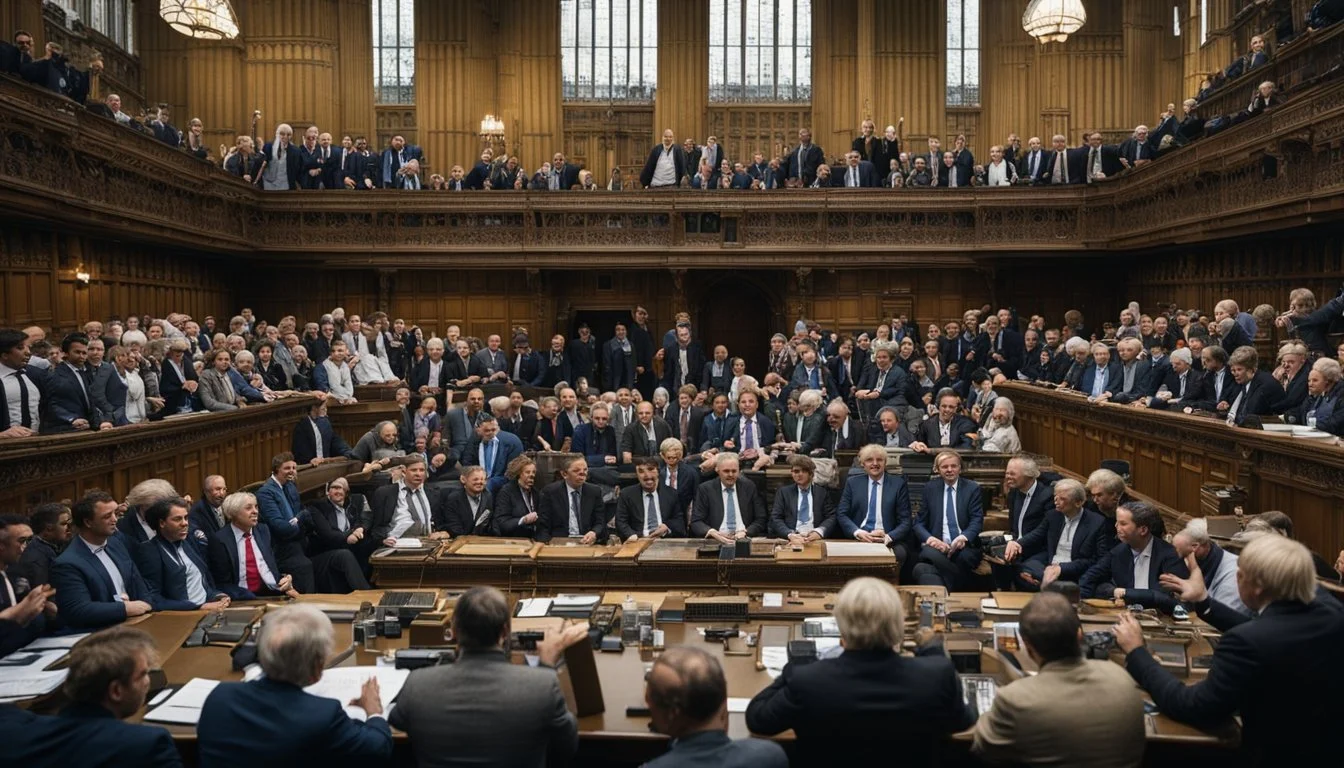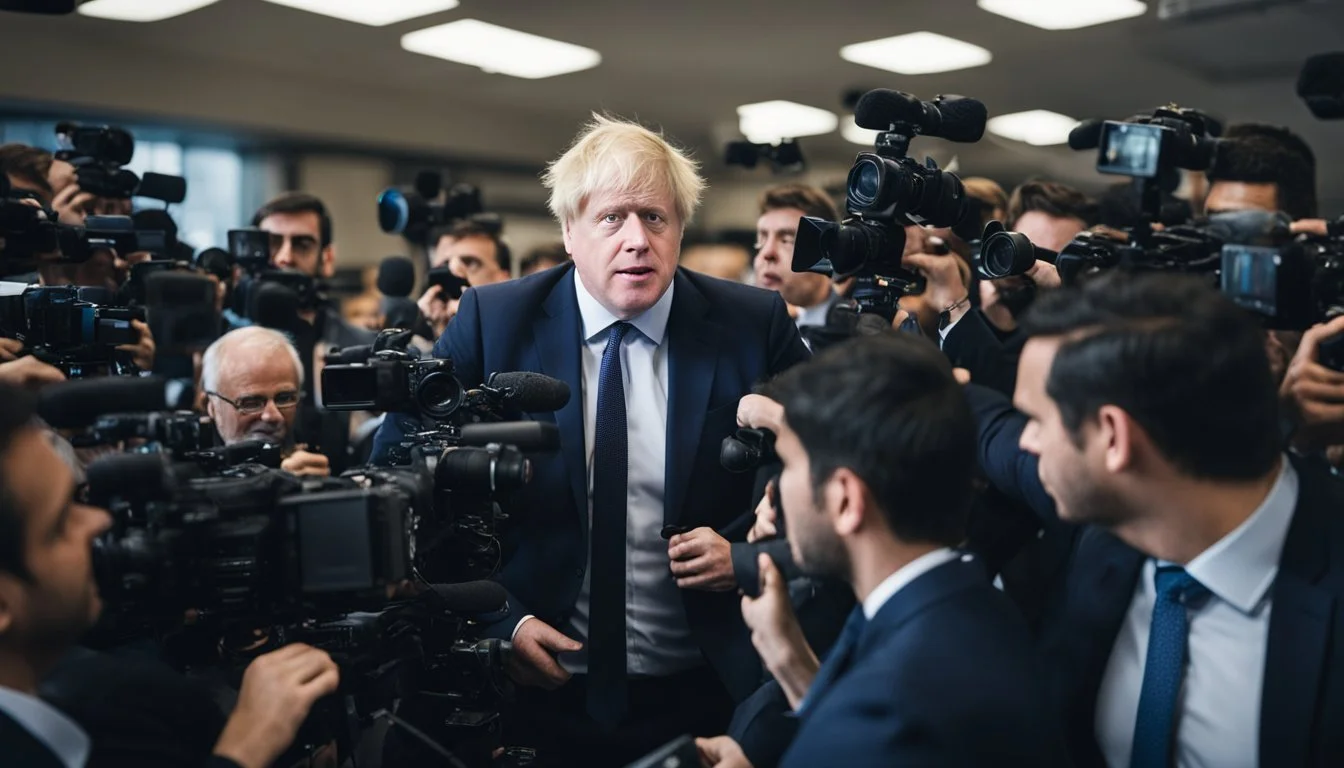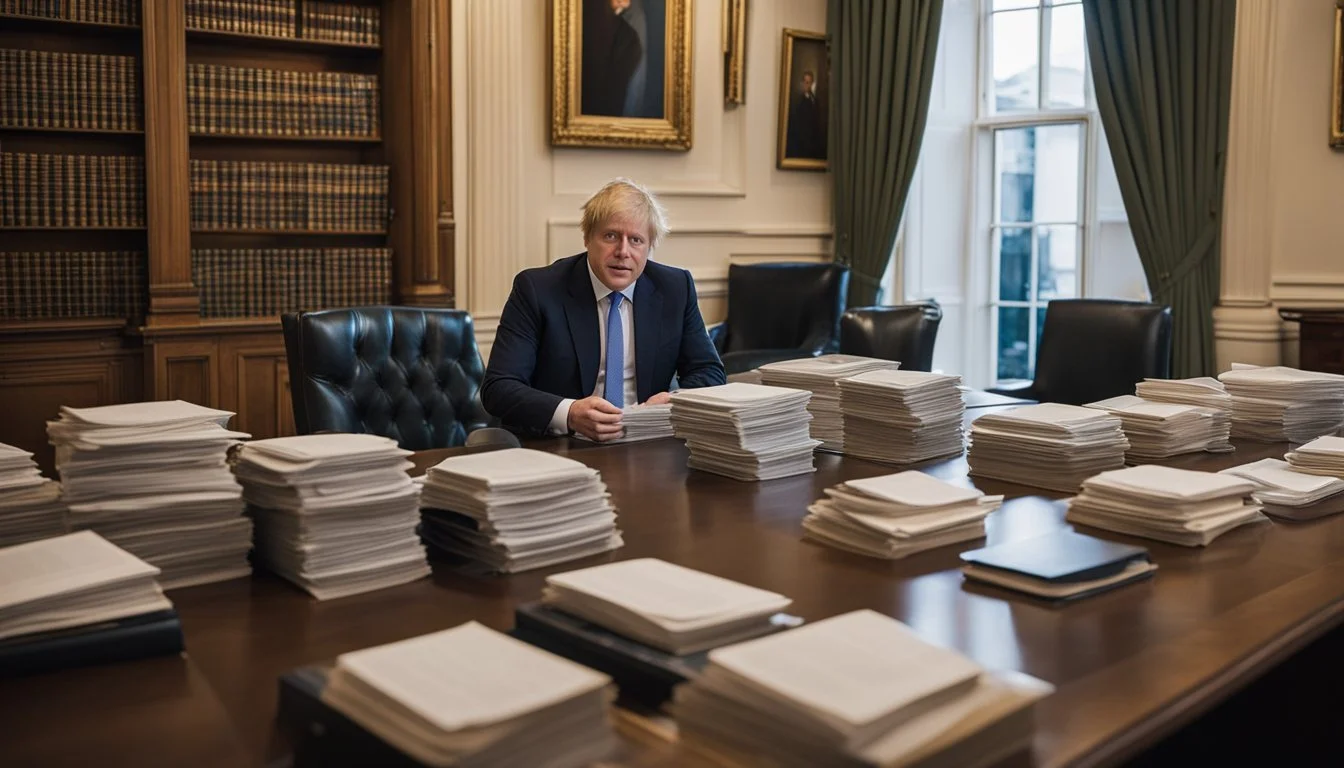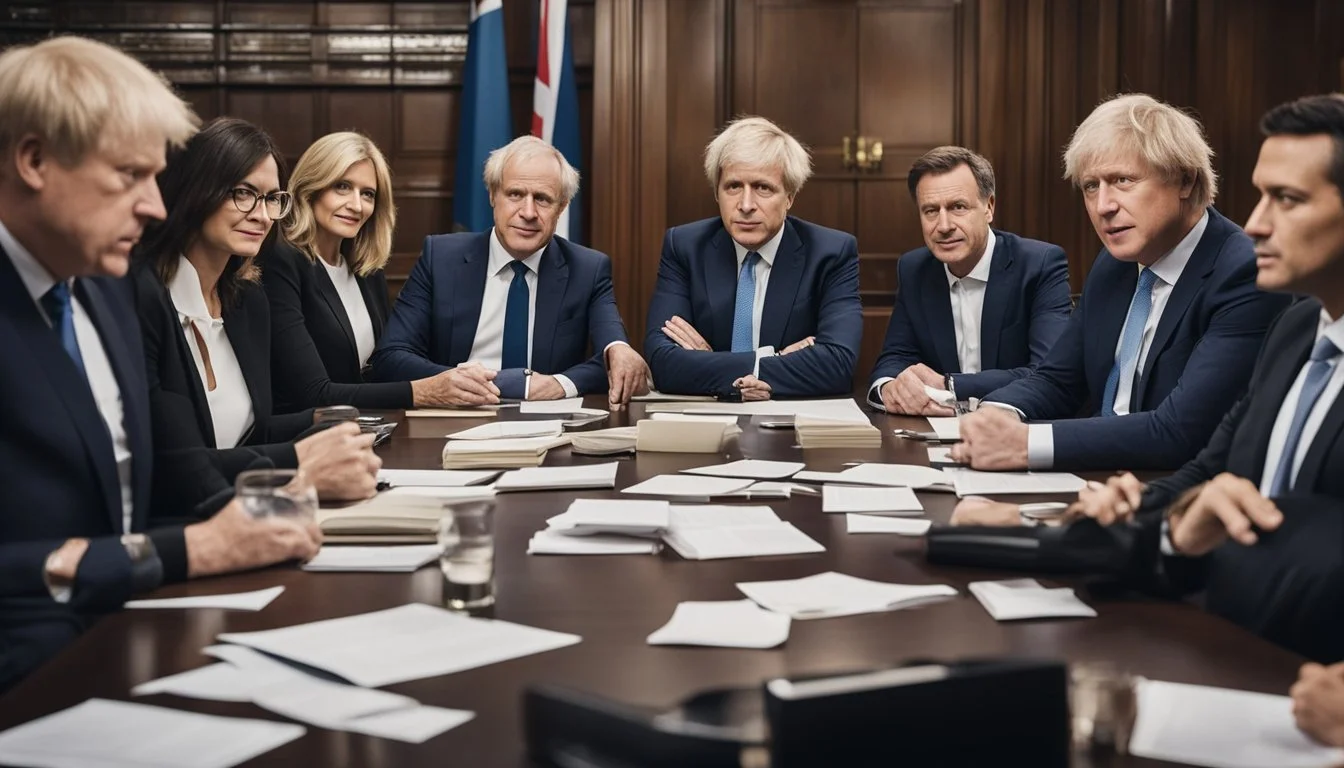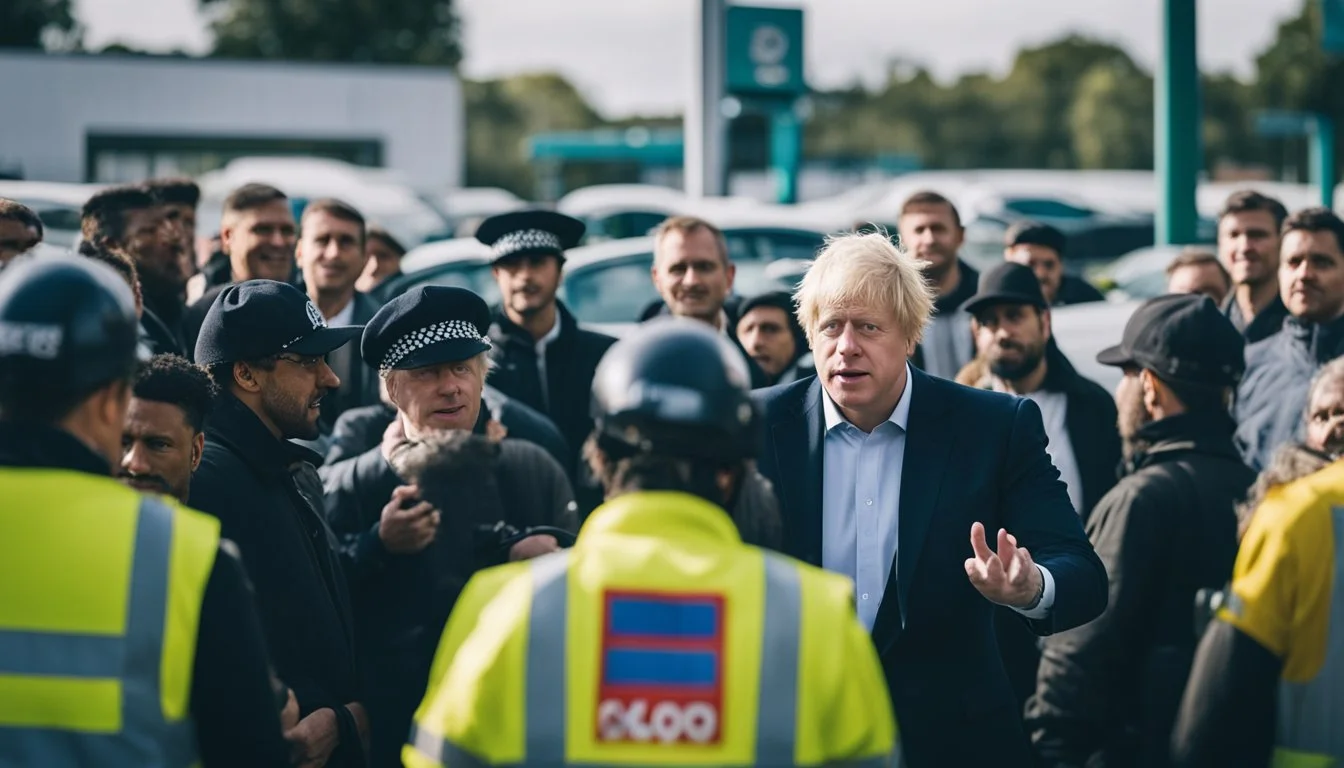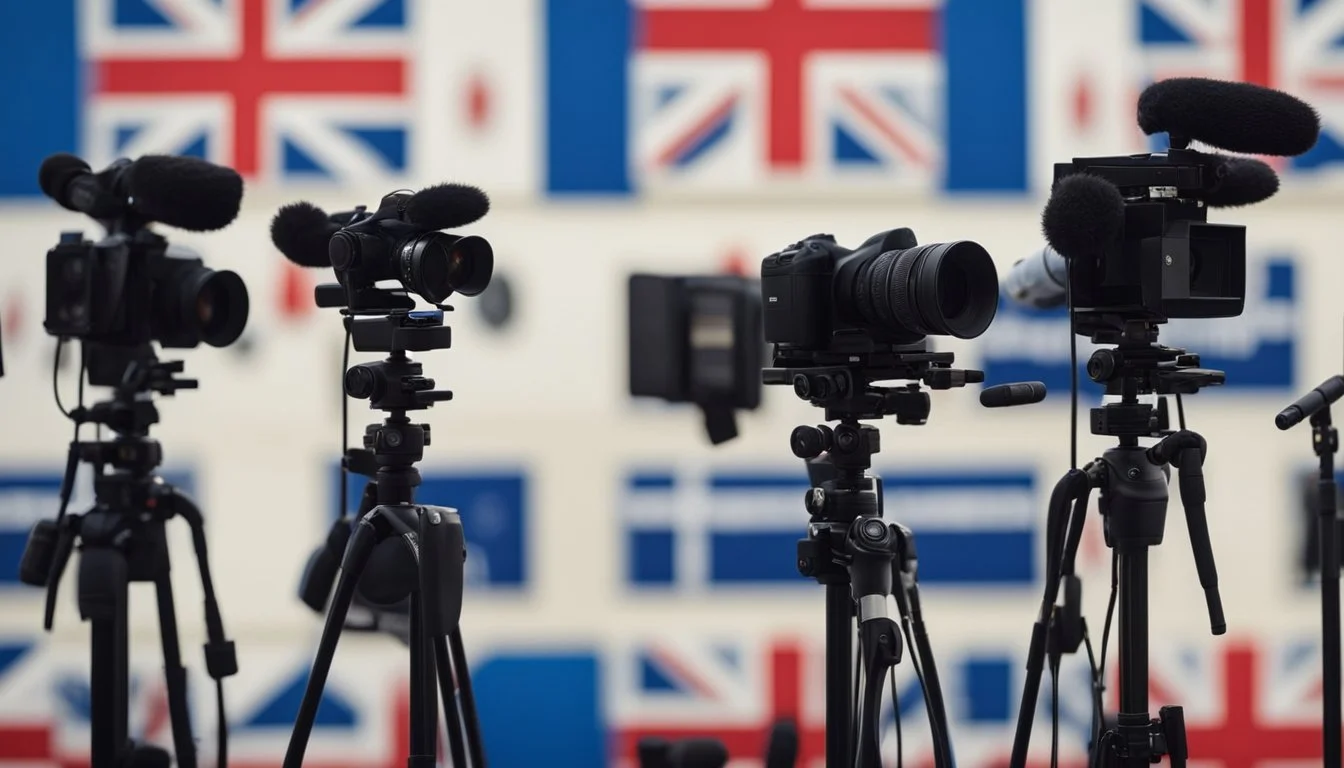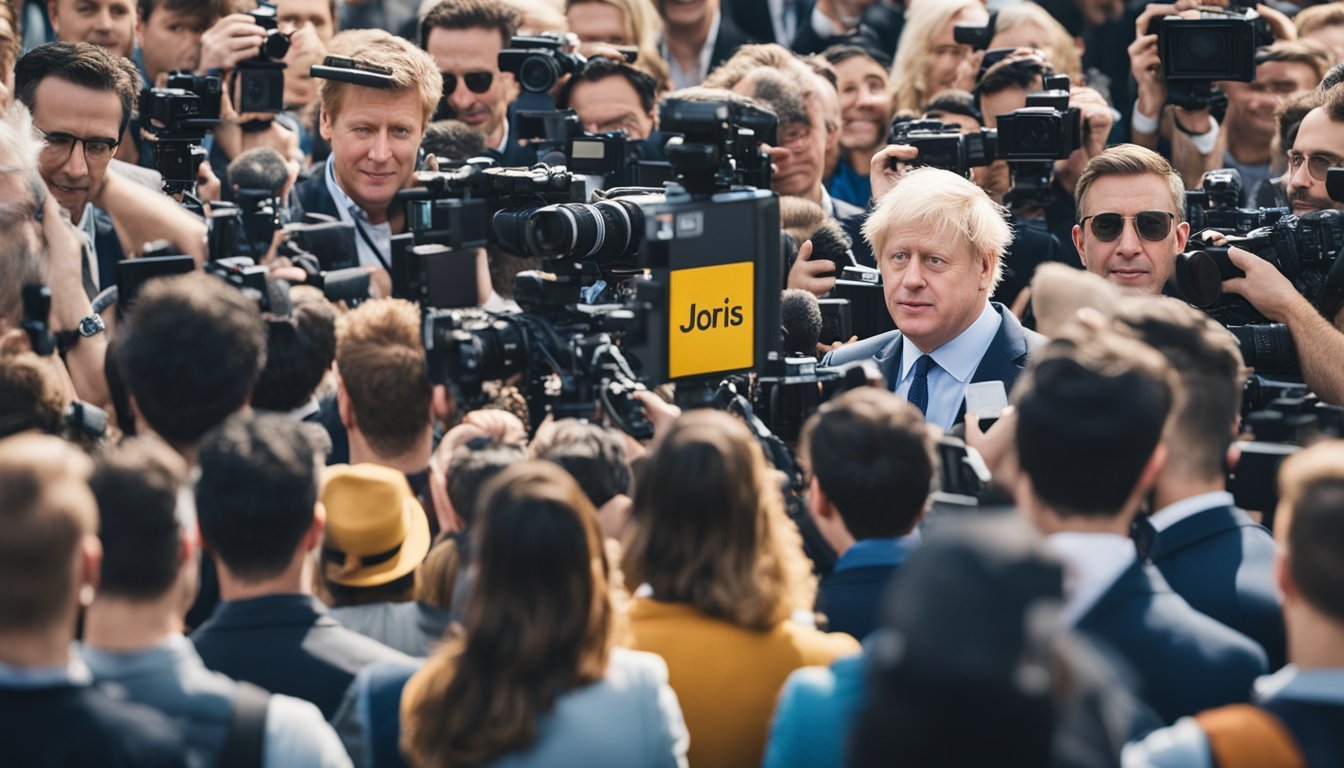14 Documentaries on the Controversial Premiership of Boris Johnson
Exploring Leadership and Legacy
Boris Johnson's tenure as the Prime Minister of the United Kingdom has been marked by numerous upheavals, from political scandals to significant policy changes. His leadership style and decisions have sparked widespread debate and analysis, leading to the creation of various documentaries aimed at exploring his controversial premiership.
For those seeking to understand the complexities and impacts of Boris Johnson's time in office, these 14 documentaries offer a comprehensive look at his leadership and its repercussions on Britain's political landscape. With contributions from political analysts, insiders, and critics, these films provide a multifaceted view of one of the most polarizing figures in recent British history.
1) The Rise and Fall of Boris Johnson (2024)
The Rise and Fall of Boris Johnson is a 2024 documentary series aired on Channel 4. It provides an in-depth look into the political career of Boris Johnson, exploring the scandals, strategic moves, and eventual downfall that marked his time as Prime Minister of the United Kingdom.
The documentary features interviews with key figures from his political journey, including Nadine Dorries, Jacob Rees-Mogg, Jennifer Arcuri, Matt Hancock, and Sajid Javid. These interviews offer insights into the private and public challenges Johnson faced.
The series also examines how Johnson's chaotic childhood influenced his political views and decisions. Viewers can learn about the significant rivalries and clashes that shaped his career choices.
Narrated by Kate Fleetwood, with appearances by Andrew Gimson and Nigel Farage, the series presents a detailed picture of Johnson's complex legacy in British politics.
This documentary is crucial for those looking to understand the intricacies of Johnson’s time in office and its impact on Britain’s future. It reveals not just the man behind the political persona but also the broader implications for the country's direction.
For more information, visit IMDb.
2) Boris Johnson's Brexit Gamble
Boris Johnson's role in the Brexit movement was pivotal and controversial. As one of the primary faces of the Vote Leave campaign, Johnson's charisma and rhetoric played a significant part in swaying public opinion toward leaving the European Union. His gamble on Brexit paid off, helping him rise rapidly in the political landscape.
Johnson's unexpected resignation announcement put him on the backbench temporarily. His rapid comeback culminated in winning the Conservative Party leadership and becoming Prime Minister in 2019. His leadership focused on delivering Brexit by any means necessary, even if it meant proroguing Parliament.
The high-stakes strategies used by Johnson included renegotiating Theresa May's withdrawal agreement and pushing through a general election to gain a stronger mandate. He succeeded, securing a decisive victory in December 2019 that finally enabled him to "Get Brexit Done."
Documentaries such as "The Rise and Fall of Boris Johnson" (2024) capture Johnson's dramatic political maneuvers and their long-lasting impacts on Britain. These films offer a detailed account of his calculated risks and the eventual realization of his Brexit vision.
For more information on this documentary, visit IMDb.
3) Leadership in Crisis: Boris Johnson
Boris Johnson's leadership faced significant scrutiny, especially during the latter part of his premiership. His tenure saw numerous controversies and ethics scandals that culminated in a political crisis.
In July 2022, Johnson resigned after more than 50 government officials stepped down in protest. This mass resignation highlighted deep-seated issues within his administration and brought his leadership abilities into question.
The Channel 4 documentary, "The Rise and Fall of Boris Johnson" (2024), provides an in-depth look at his career. It features interviews with close associates and explores the factors leading to the crisis. More information.
ITV journalist Andrew Neil also delved into this turbulent period with his documentary on Johnson's leadership crisis. Neil describes it as the most significant leadership challenge in three decades. His program reflects on how political dynamics and internal conflicts influenced Johnson's downfall. More information.
Another notable work, featured on IMDb, examines Johnson's political journey from a charismatic leader to his eventual resignation. This series sheds light on the strategic moves and backdoor betrayals that defined his leadership. More information.
These documentaries collectively offer a nuanced perspective on Boris Johnson's leadership crisis, presenting various viewpoints on the complex political landscape that surrounded his premiership.
4) Pandemic Politics: Boris Johnson's Response to COVID-19
Boris Johnson's handling of the COVID-19 pandemic has been widely scrutinized and critiqued. His approach was characterized by delays and a perceived lack of clarity, impacting the UK’s ability to tackle the virus effectively.
One significant incident damaging public trust was when Dominic Cummings, Johnson's chief adviser, breached COVID guidelines. This event raised questions about leadership and adherence to rules within the government.
The UK faced severe challenges as the virus spread. Johnson’s administration has been accused of being underprepared, and the inquiry into the government's response highlighted issues in decision-making at the highest levels.
Evidence presented at the COVID inquiry revealed that Johnson faced substantial criticism for his "mad and dangerous" approach, with accusations of frequent indecision. These aspects made efficient virus management difficult.
Documentaries examining this period often focus on these critical moments and decisions. They provide insight into how the UK government’s handling of the pandemic impacted public health and policy.
For further information on these documentaries, relevant details and links are as follows:
"The Virus and the Vaccine" (2021) - IMDb
"Locked Down in London" (2021) - IMDb
"The PM and the Pandemic" (2022) - IMDb
"Leadership in Crisis" (2023) - IMDb
"Government in the Hot Seat" (2023) - IMDb
5) Boris Johnson: A Divisive Leader
Boris Johnson has been a polarizing figure in British politics. His tenure as Prime Minister saw significant events that deeply divided opinion across the spectrum.
Johnson's leadership style often drew intense criticism. He was known for his unorthodox approach, which some saw as refreshing and others as reckless.
His handling of Brexit was a primary source of division. While many praised him for "getting Brexit done," others believed his actions exacerbated the country's political and social divides.
Johnson's response to the COVID-19 pandemic also sparked controversy. Supporters commended his swift vaccine rollout, but detractors criticized his initial handling of the crisis and perceived inconsistency in messaging.
Personal scandals further fueled his divisive image. Allegations of misconduct and breaches of decorum during his tenure frequently made headlines, influencing public perception negatively.
Throughout his career, Johnson's charisma and communication skills garnered substantial media attention, both positive and negative. His ability to connect with a broad audience contrasted sharply with accusations of elitism and dishonesty.
In essence, Boris Johnson's time in office is marked by his ability to engender both strong support and fierce opposition, reflecting the complexities of modern British politics.
For more information on the impact of Boris Johnson's leadership, you can explore the documentary series (2024) that provide deeper insights into his career.
6) Brexit: Boris Johnson's High-Stakes Game
Boris Johnson's role in the Brexit saga was pivotal. As one of the foremost voices of the Leave campaign, he energized a movement that culminated in the UK's referendum decision in 2016.
Once in office as Prime Minister, Johnson's primary mandate was to 'Get Brexit Done.' This slogan defined his 2019 general election campaign, which he won decisively.
Johnson renegotiated the Withdrawal Agreement with the European Union, emphasizing British sovereignty. The path to Brexit was turbulent, with intense political maneuvering and economic uncertainty.
Documentary filmmakers have chronicled Johnson's Brexit journey extensively. These documentaries explore his strategies, public addresses, and political tactics during this tumultuous period.
The fate of the UK post-Brexit remains a subject of ongoing analysis, with debates over the economic and social impacts continuing. These documentaries provide detailed insights into Johnson's high-stakes gamble, offering viewers a comprehensive look at his controversial premiership.
For further information on the documentaries mentioned, you can explore more on reputable sites like Wikipedia or IMDB.
7) From Mayor to Prime Minister: Boris Johnson's Journey
Boris Johnson's political journey began as Mayor of London, where he served from 2008 to 2016.
During his tenure, Johnson focused on several high-profile projects, including the introduction of the "Boris Bikes" cycle hire scheme and the successful hosting of the 2012 Olympic Games.
In 2016, Johnson played a pivotal role in the Brexit referendum, becoming a prominent face of the Vote Leave campaign.
Following the referendum, Johnson was appointed Foreign Secretary under Prime Minister Theresa May but resigned in 2018 due to disagreements over her Brexit strategy.
In July 2019, Johnson became the leader of the Conservative Party and subsequently, the Prime Minister of the United Kingdom.
His premiership focused on delivering Brexit, which was achieved on January 31, 2020, following several delays and negotiations.
Throughout his time as Prime Minister, Johnson faced numerous challenges, including the COVID-19 pandemic.
He implemented strict lockdown measures and led the UK's vaccination rollout, which was one of the fastest in the world.
Despite these efforts, his handling of the pandemic and internal party controversies led to fluctuating public approval ratings.
In July 2022, Johnson announced his resignation amid increasing pressure from within his party, marking the end of his premiership.
This documentary details the journey from mayoral initiatives to navigating the complexities of Brexit and the challenges faced during his time as Prime Minister. More Info
8) Boris Johnson and the Media: A Love-Hate Relationship
Boris Johnson's relationship with the media has fluctuated throughout his career. From his time as a journalist to his years as Prime Minister, the media often simultaneously scrutinized and celebrated him.
Johnson's early career as a journalist at The Times ended abruptly due to a scandal involving fabricated quotes. This early encounter marked the beginning of a complex relationship with the press. More Info.
As Mayor of London, he was often a media darling, known for his colorful personality and memorable stunts. This period was marked by significant positive coverage, which bolstered his public image. More Info.
During his premiership, the media landscape changed. Scandals, including the infamous “partygate,” led to intense scrutiny and negative press. His handling of Brexit and the COVID-19 pandemic were focal points of critique. More Info.
Johnson's ability to draw media attention was both a strength and a vulnerability. His charismatic persona ensured media coverage, but controversies followed closely, often leading to a love-hate dynamic. More Info.
This dual relationship with the media significantly influenced public perception and his political journey.
9) Inside 10 Downing Street with Boris Johnson
Boris Johnson's tenure at 10 Downing Street was marked by an array of significant events and challenges. Unlike his predecessors, Johnson chose to reside in the four-bedroom flat above No 11 Downing Street. Here, he lived with his fiancée, Carrie Symonds, and their child.
The iconic location of No 10 Downing Street served as the backdrop to numerous crucial decisions. His office featured mahogany wooden furniture, which underscored the traditional yet powerful ambiance of the space. A significant feature within the premises is the "Wall of Fame," displaying portraits of past prime ministers, including Winston Churchill and Robert Walpole.
Johnson's time in office often saw him using the spacious, open rooms within No 10 for key meetings and discussions. These rooms witnessed many historic moments, from Brexit negotiations to managing the COVID-19 pandemic. The stately surroundings provided a reminder of the weight of responsibility that came with the position.
Documentaries like this one reveal unique perspectives on the inner workings of the British Government's nerve center during Boris Johnson's leadership. The details of his daily professional life and the setting of these high-stake interactions offer viewers an unprecedented glimpse into one of the most influential periods in recent British history.
For more information on "Inside 10 Downing Street with Boris Johnson," visit the IMDb page [2024].
10) Public Perception of Boris Johnson's Policies
Public perception of Boris Johnson’s policies has been highly polarized. His tenure as Prime Minister saw significant debates and varying opinions on key issues.
The handling of Brexit remains one of the most contentious aspects. Many praised his determination to “get Brexit done,” believing it ended the prolonged uncertainty. Others criticized it for economic disruptions and strained relations with the EU.
COVID-19 management also garnered mixed reactions. Some supported the swift vaccine rollout and financial support measures. Conversely, critics pointed to delayed lockdowns and inconsistencies in policy enforcement.
Environmental policies further showcased the divide. The commitment to achieving net-zero emissions by 2050 was lauded by environmentalists. Meanwhile, opponents argued that more immediate action was needed.
Johnson's stance on immigration and asylum policies drew sharp public scrutiny. Supporters often viewed stricter immigration controls as necessary for national security. Critics, meanwhile, saw these policies as harsh and inhumane.
His approach to social issues and economic reforms, including tax cuts and spending on public services, polarized opinions similarly. Those in favor saw them as stimulating economic growth. Detractors felt these measures disproportionately benefited the wealthy and deepened social inequalities.
11) Boris Johnson and the NHS: A Tumultuous Relationship
Boris Johnson's tenure as Prime Minister saw many challenges, not least his dealings with the NHS. His leadership coincided with the COVID-19 pandemic, putting immense pressure on the health service. Johnson’s own hospitalization at St Thomas' Hospital in 2020 highlighted the NHS's critical role and capacity issues.
Johnson announced funding injections aiming to reduce NHS backlogs. Despite these efforts, critics argued that these measures were insufficient. They believe chronic underfunding and structural inefficiencies remained unaddressed. The debate about privatization and NHS management continued to be contentious under his leadership.
His administration also proposed sweeping reforms, aiming to centralize control that had been devolved in earlier years. The proposed changes aimed to streamline operations and improve accountability. The push for greater control sparked debates about bureaucratic overreach and the balance of power within the healthcare system.
Throughout his premiership, Johnson's relationship with NHS staff and unions was complex. He often praised their efforts during the pandemic. However, many healthcare professionals felt unsupported, especially concerning pay and working conditions. This strained relationship underscored persistent tensions between government policy and frontline realities.
12) Economic Policies Under Boris Johnson: Success or Failure?
Boris Johnson's tenure as Prime Minister saw significant economic challenges. Upon taking office in July 2019, inflation in the UK was around 2 percent. By 2024, it had surged to over 10 percent, a notable shift affecting the cost of living for many.
The COVID-19 pandemic forced the government into unprecedented economic interventions. Policies included substantial financial support packages and furlough schemes. These measures aimed to maintain economic stability but also increased national debt considerably.
Brexit defined much of Johnson's economic policy. The exit from the European Union led to shifts in trade dynamics. New trade deals were struck, but the overall impact on the economy remains debated among experts.
Real incomes declined during Johnson's premiership. This erosion of purchasing power posed a significant issue for many households. The combination of high inflation and stagnant wages contributed to this decline.
The government's stance on public spending and investment saw mixed results. Infrastructure projects were prioritized, yet critics argue that these did not yield immediate benefits.
13) Boris Johnson's Cabinet: Key Players and Controversies
Boris Johnson's premiership saw significant changes in his Cabinet, highlighting the tumultuous nature of his leadership.
Michael Gove, a key ally, was abruptly removed from his position as Cabinet Minister, reflecting the internal strife within the government. This dismissal occurred amid a wider wave of resignations, shaking the stability of Johnson's administration. More on Michael Gove.
Liz Truss served as International Trade Secretary in Johnson's Cabinet. Previously, she held the role of the first female Lord Chancellor under Theresa May. Truss's journey shows her growing influence and the evolving dynamics within the Cabinet. More on Liz Truss.
Dominic Raab experienced a notable shift when he was removed as Foreign Secretary. Raab, known for his karate black belt, faced challenges aligning with Johnson's leadership, marking a significant Cabinet reshuffle. More on Dominic Raab.
These key players and their respective controversies illustrate the complexities and internal conflicts of Boris Johnson's Cabinet, contributing to the unpredictability and contentious nature of his time as Prime Minister.
14) Boris Johnson's Handling of the 2021 Fuel Crisis
During the 2021 fuel crisis in the United Kingdom, Boris Johnson faced significant criticism. The crisis, triggered by a shortage of HGV drivers, led to long queues at petrol stations and widespread panic buying.
Johnson's government initially tried to downplay the severity of the situation, attributing the shortage to panic buying rather than systemic issues.
To address the crisis, Johnson announced a temporary visa scheme for foreign HGV drivers. This move aimed to alleviate driver shortages but faced skepticism regarding its effectiveness and timeliness.
Johnson also mobilized the military to assist with fuel deliveries. While this measure provided some relief, critics argued it highlighted the government's lack of preparedness.
The 2021 fuel crisis exposed weaknesses in the UK's supply chain and raised questions about Brexit's impact on labor shortages. Johnson's response was seen by many as reactive rather than proactive.
For more on his handling of the crisis, refer to the documentary “The Rise and Fall of Boris Johnson: Episode 4” (2024) on IMDb.
Background of Boris Johnson
Boris Johnson, one of the most recognizable political figures in Britain, has a background rooted in a privileged upbringing and a tumultuous political career that saw him rise to the pinnacle of power.
Early Life and Career
Boris Johnson was born Alexander Boris de Pfeffel Johnson on June 19, 1964, in New York City. His early life was marked by frequent relocations due to his parents' careers. He attended Eton College, a prestigious boarding school, where he became known for his confidence and intelligence.
Johnson pursued higher education at Balliol College, Oxford, where he studied Classics. During his time at Oxford, he served as president of the Oxford Union, a debating society that has produced many notable politicians. After graduating, Johnson worked as a journalist, writing for publications such as The Times, The Daily Telegraph, and The Spectator.
Political Ascent
Johnson's political career began in earnest when he was elected as the Member of Parliament (MP) for Henley in 2001. His charismatic personality and sharp wit quickly gained him attention. In 2008, he became the Mayor of London, a position he held until 2016. His tenure focused on public transportation improvements and the 2012 London Olympics.
In 2015, Johnson returned to Parliament as the MP for Uxbridge and South Ruislip. His role in the 2016 Brexit referendum was significant; he was a prominent voice for the Leave campaign. In 2019, following Theresa May's resignation, Johnson was elected as leader of the Conservative Party and subsequently became Prime Minister, navigating the country through Brexit and the COVID-19 pandemic.
Key Policies and Actions
Boris Johnson's premiership was marked by significant decisions, most notably his handling of Brexit, steering the UK through the COVID-19 pandemic, and implementing economic policies aimed at recovery and growth.
Brexit Implementation
Boris Johnson played a critical role in pushing forward the Brexit agenda. He renegotiated the withdrawal agreement with the European Union and secured a majority in Parliament for its passage in January 2020.
His government focused on ending free movement between the UK and EU, introducing a points-based immigration system.
Key Actions:
Withdrawal Agreement Renegotiation: Implemented changes to the Northern Ireland protocol to avoid a hard border with Ireland.
Trade Deals: Signed new trade agreements with countries like Japan and Australia.
Immigration System: Established a points-based system to manage immigration post-Brexit.
Response to COVID-19 Pandemic
Boris Johnson's response to the COVID-19 pandemic saw a mix of early criticism and later praise. Initially, his government was slow to impose restrictions but later took aggressive measures to curb the spread.
Key Actions:
Lockdowns: Imposed nationwide lockdowns starting in March 2020.
Vaccination Program: Launched a rapid vaccination campaign in December 2020, making the UK one of the first countries to begin mass vaccinations.
Economic Support: Introduced the furlough scheme to support workers and businesses affected by the pandemic, paying up to 80% of wages.
Economic Policies
Johnson’s economic policies aimed to navigate the post-Brexit landscape and the financial fallout from the COVID-19 pandemic. His government targeted economic recovery and growth through a variety of measures.
Key Actions:
Spending on Infrastructure: Announced significant investments in infrastructure projects, including improvements to transportation and broadband.
Taxation Changes: Implemented tax cuts aimed at stimulating economic activity and supporting businesses.
Support for Innovation: Promoted technology and innovation, funding research and development to drive future economic growth.
Public and Media Perception
Public and media views on Boris Johnson have fluctuated dramatically throughout his time in politics, from his rise to prominence to his eventual fall from grace. These views have been shaped by multiple factors including his handling of Brexit, the COVID-19 pandemic, and various scandals during his tenure.
Public Approval Ratings
Boris Johnson's public approval ratings provide a stark reflection of his controversial premiership. Initially, he enjoyed a significant spike in popularity following his decisive stance on Brexit. The 2019 general election, where the Conservative Party secured a substantial majority, further solidified his approval.
However, public sentiment began to shift as his handling of the COVID-19 pandemic drew increasing scrutiny. Mixed messages, delays in response, and accusations of being unprepared led to a sharp decline in public trust. Frequent scandals, including "Partygate," further eroded his standing. By the end of his tenure, Johnson's approval ratings had substantially dropped, indicating widespread disillusionment among the electorate.
Media Coverage
Media coverage played a crucial role in shaping Johnson's image. Early coverage often portrayed him as a charismatic and unconventional leader. Outlets such as The Telegraph and The Spectator, where Johnson previously worked, were particularly favorable, emphasizing his populist appeal and wit.
As his career evolved, the media's tone shifted. Major events, including the Brexit negotiations and the pandemic, highlighted inconsistencies and alleged incompetence. Investigative reports and documentaries, like Channel 4's "The Rise and Fall of Boris Johnson," underscored his controversies and governance style. Prominent figures and pundits frequently debated his actions, contributing to a complex and often polarized public perception.

